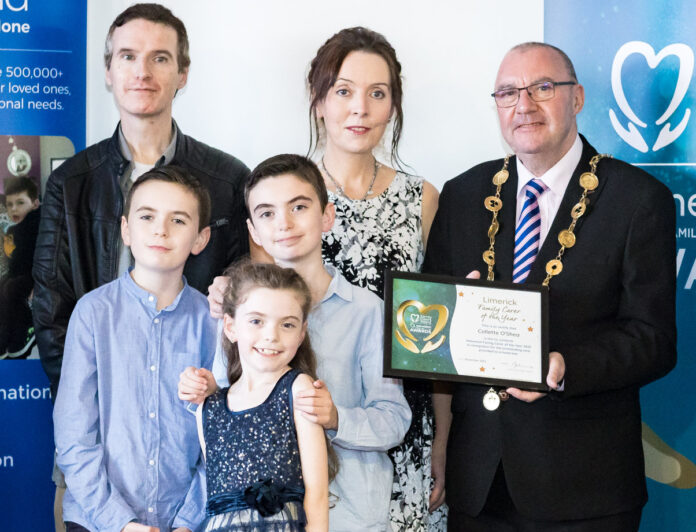
A LIMERICK woman who looks after her husband and son who have been diagnosed with debilitating illnesses has been named 2022 Netwatch Limerick Family Carer of the Year.
Colette O’Shea from Lisnagry cares for her husband Kieran who has Motor Neuron Disease and frontal lobe dementia. She advocates tirelessly for Kieran and is his voice and his strength as his condition progresses.
She also cares for their 11-year-old son Luke who was diagnosed in 2016 with advanced Crohn’s Disease.
Her aim is to ensure her husband and son receive the best care possible and to make life as normal as possible for both, while also raising her other two children Haydn (10) and Caoimhe (8).
The Netwatch Family Carer of the Year Awards, which are administered by Family Carers Ireland, recognise the contribution of the more than 500,000 people in Ireland who provide care to family members in their own home.
These include children or adults with additional needs, physical or intellectual disabilities, frail older people, those with palliative care needs or those living with chronic illnesses, mental health challenges or addiction.
The 19 million hours of unpaid care provided each week by family carers would cost the State €20 billion a year to replace.
Despite the immense workload they take on, family carers often go unnoticed in the community. This has particularly been the case during the pandemic when many were isolated and left without outside support.
Family Carers Ireland Community Support Manager for Limerick, Jean Ryan, said that caring for a loved one at home can be rewarding but it can also be challenging, particularly in the absence of vital supports and services including respite.
“This can take a toll on a person’s physical, mental, financial and social wellbeing. Often, a person can find themselves taking on the role of a family carer with little or no warning. They are doing extraordinary work that is too often unseen and undervalued,” Ms Ryan explained.
“These awards are an important event in our calendar every year as we seek to provide some small recognition to all of those who care at home for loved ones with additional needs and to ensure their stories are heard.
“We want family carers to know that they are not alone and that we are here to help them no matter where they find themselves on their caring journey. As a society, we must ensure that family carers are not only recognised for their immense contribution, but truly supported to care safely at home,” she added.










